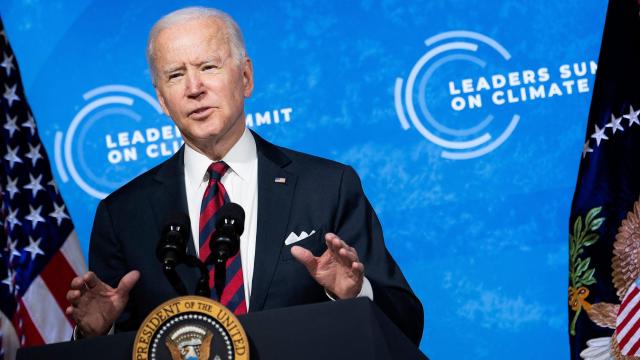Updated climate pledges the U.S., China, and a dozen other nations have made in recent weeks will likely put the world on track for 4.3 degrees Fahrenheit (2.4 degrees Celsius) of warming by the end of the century, according to a new analysis. This is a modicum of good news, assuming countries actually follow through, though more needs to be done to protect the climate.
The analysis comes from Climate Action Tracker, a scientific group that measures the governmental climate plans, and is based on revised pledges from, among others, the European Union, China, Japan, and the UK released around President Joe Biden’s Earth Day Summit last month. Before these new commitments, the group’s forecast stood at 4.7 degrees Fahrenheit (2.6 degrees Celsius) of warming by 2100, so it’s a modest improvement. Even current levels of warming have created conditions that endanger society.
“The world has already warmed by 1.2 degrees [Celsius, or 2.2 degrees Fahrenheit above pre-industrial levels], and you can look around and see the amount of extreme weather, floods, fires, that we’re facing already because of it, and you see that’s already quite significant,” said Claire Stockwell, Climate Action Tracker’s senior climate analyst. Even with these new pledges, we’re looking at double that level of warming.
The report shows that if 131 of the Paris Agreement’s 190 signatories — which together account for 73% of global emissions — actually reach their net zero targets, the world will have a 66% chance of limiting warming to 4 degrees Fahrenheit (2.2 degrees Celsius). Somewhat hearteningly, we’d have a 50% chance of meeting the 2 degrees Celsius goal of the Paris Agreement. Doing so would stave off truly catastrophic impacts such as reaching a tipping point that would unleash dozens of feet of sea level rise.
But that estimate still shows the world will blow past the 1.5-degree-Celsius (2.7-degree-Fahrenheit) temperature threshold also enshrined the Paris Agreement as an optimal target. It isn’t arbitrary, either. A groundbreaking 2018 United Nations report found that crossing that line would usher in irreversible climate damages, including sea level rise that could render some small island nations unlivable, widespread extinction, destruction of many coral reefs, and severe drought that would upend the livelihoods of millions of farmers.
The report’s findings show that almost no nations’ targets would set the world on that pathway. The exception is the UK, and even it is lagging behind what Climate Action Tracker said should be expected of it because due to its historically high levels of emissions. A just climate plan for the UK — and other rich countries that are responsible for the majority of historic emissions — would mean not just reducing national carbon pollution, but also paying developing countries to help them mitigate theirs as well.
Some current large emitters, including India and Indonesia, haven’t updated their targets under the Paris Agreement yet. Nations were expected to do so by the end of last year.
Pledges by themselves don’t lower carbon emissions, and the authors have reason to doubt that they’ll turn into real policy change. At Biden’s climate talks last month, Brazil’s President Jair Bolsonaro updated the nation’s climate pledge, bringing the goal of net-zero forward 10 years from 2060 to 2050. Yet that “commitment is dubious,” the authors of the report wrote, because last year, Bolsonaro actually weakened the nation’s 2030 target, putting the longer-term targets further from reach. Bolsonaro also weakened Amazon protections immediately after promising to increase them at the summit, showing the emptiness of even his recent promises. Similarly, Australia promised last month to reach net zero emissions at an unspecified date, yet failed to announce stronger 2030 targets.
“You’ve still got the policy implementation gap,” said Stockwell. “Countries need to be thinking not only about how much they will pledge to lower their emissions but also about what policies they need to meet those targets. And I mean not only their 2030 reduction targets but also what policies they need to implement to get all the way to net zero by 2050 or before.”
A separate analysis from Climate Action Tracker released last year analysed how far off 36 highly-emitting nations’ current policies are from those needed to meet their stated targets, and found that none of those countries could meet their goals without serious policy changes. It’s not yet updated to include the most recent pledges — a new edition will be released this summer — but it doesn’t paint a particularly rosy picture. That doesn’t mean, however, that the authors don’t have hope the world could turn things around.
“I do think it’s really clear that the Paris Agreement is driving climate action,” said Stockwell. “We were continuing to see an improvement in our temperature estimates based on set targets within the Paris Agreement even before we considered these more ambitious net zero targets that countries recently set … so I think that is definitely very encouraging.”
The challenge now will be twofold. Nations who haven’t submitted more ambitious 2030 targets should do so. And nations that have already done so must implement policies that allow them to actually meet those goals. Stockwell also said she hopes even countries that have updated their commitments will strengthen them further before the UN international climate talks in Glasgow this November.
“It’s good we have new targets. But really, they should just be a floor,” she said.
